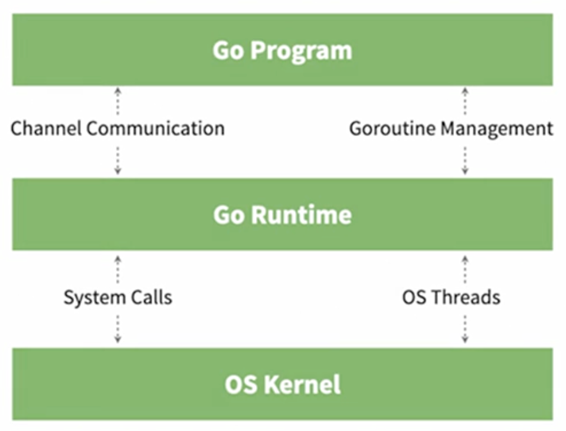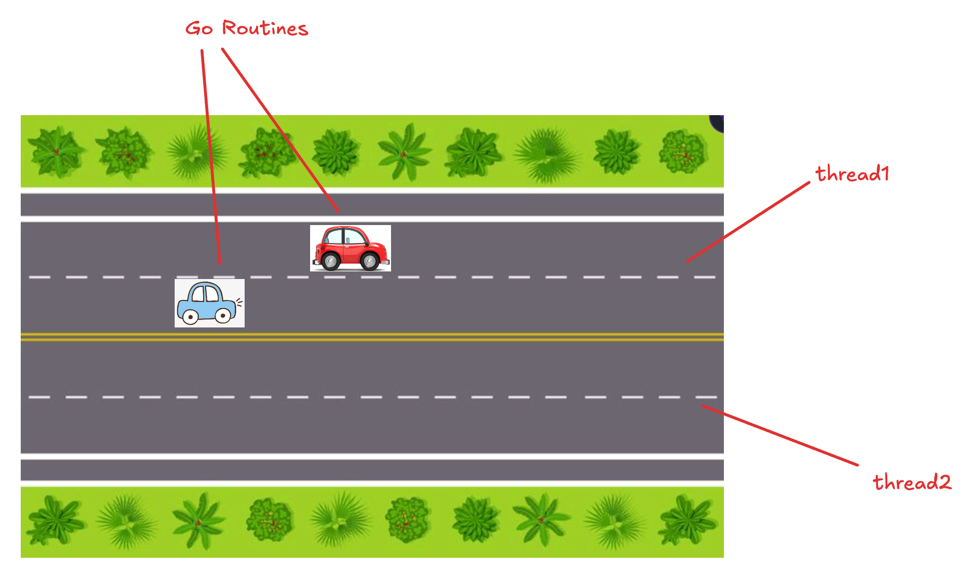concurrency-in-go
Concurrency In Golang
by Gaurav Kabra
Parallelism vs Concurrency
- True parallel tasks execute independently and simultaneously. Thus, require multiple CPUs.

- Concurrent tasks are interleaving and non-deterministic in order of execution. My computer does not have 425 cores, yet able to run 425 processes.
Concurrency is handled by Go Runtime.

Go Routines
- Abstraction over threads
- In general,
# of go routines > # of threads
- Like threads, goroutines share same address space.
go f(x)
Above syntax makes f(x) run on a goroutine.
E.g.,
package main
import "fmt"
func main() {
go hello()
bye()
}
func hello() {
fmt.Println("hello")
}
func bye() {
fmt.Println("bye")
}
/**
Can produce different outputs like:
1.
bye
2.
bye
hello
*/
This is because a go routine does not block main goroutine.
One of the common ways to keep main goroutine alive is by using time.Sleep():
package main
import (
"fmt"
"time"
)
func main() {
go hi()
// NEVER use Sleep for aliveness in prod
time.Sleep(1 * time.Second)
tata()
}
func hi() {
fmt.Println("hi")
}
func tata() {
fmt.Println("tata")
}
/**
In general, produces:
hi
tata
*/
sync.waitGroup
- waits for goroutines to finish
- Under the hood, it keep counter for number of goroutines to finish
- All types in
syncpackage MUST be passed as pointers to functions
package main
import (
"fmt"
"sync"
)
func main() {
var wg sync.WaitGroup
wg.Add(1) // need to wait for one goroutine before exiting main goroutine
go hey(&wg)
wg.Wait()
seeyou()
}
func hey(wg *sync.WaitGroup) {
defer wg.Done() // equivalent to wg.Add(-1)
fmt.Println("hey")
}
func seeyou() {
fmt.Println("seeyou")
}
/**
Deterministically produces output:
hey
seeyou
*/
Race Condition
- Multiple goroutine try CUD on shared data (critical section) simultaneously
-raceflag (race detector) can be used to print exact cause of panic. E.g.go run -race main.go- The
Mappanics on concurrent CUD operations. Hencesync.Mapshould be used
func (m *Map) Load(key interface{}) (value interface{}, ok bool)
func (m *Map) Store(key, value interface{})
func (m *Map) Range(f func(key, value interface{})) bool // calls f() for all (K, V) pairs
- Locks:
sync.Mutex
func (m *Mutex) Lock()
func (m *Mutex) Unlock()
Channels
- to pass values between goroutines that don’t directly call each other (yes, channels are usable only by goroutines)
- One way is to pass pointers (communicating by shared memory)
- Channels are other way. They are FIFO queues
chanis reserved keyword and<-is channel operator- A channel is associated to only one data-type
ch := make(chan T)
ch <- data // sending
data := <- ch // receiving
- Sending and receiving are both blocking
- Types of channels:
- Unbuffered: Zero capacity. Sender and receiver both must be present (synchronous)
- Buffered: Pre-defined capacity. Abstraction over array (asynchronous)
- Channels are always passed as pointers and hence no need to pass as
&ch. Justchsuffices - channels are first-class citizen (part of
builtin.go) and hence need no import
package main
import (
"fmt"
"time"
)
func main() {
ch := make(chan string) // unbuffered channel
go greet(ch)
time.Sleep(1 * time.Second)
fmt.Println(<-ch)
}
func greet(ch chan string) {
fmt.Println("Greet starting")
ch <- "Hello"
fmt.Println("Greet ending")
}
/**
Since channel is unbuffered, sender (greet goroutine) wait for receiver (main goroutine)
Hence output is just:
Greet starting
Hello
*/
package main
import (
"fmt"
"time"
)
func main() {
ch := make(chan string, 1) // unbuffered channel
go aloha(ch)
time.Sleep(1 * time.Second)
fmt.Println(<-ch)
}
func aloha(ch chan string) {
fmt.Println("Aloha starting")
ch <- "Aloha"
fmt.Println("Aloha ending")
}
/**
Since channel is buffered, sender (greet goroutine) DOES NOT wait for receiver (main goroutine)
Hence output is:
Aloha starting
Aloha ending
Aloha
*/
- Channel directions:
- Bidirectional (default,
chan T) - Unidirectional (
chan<- Tor<-chan T) - the default (bidirectional) is implicitly casted to unidirectional while sending/receiving
- Bidirectional (default,
- Close a channel as
close(ch)- Sending causes panic
- Receiving returns zero-value of channel data-type once closed channel does not have anymore values
- Closing again causes panic
- A
nilchannel blocks both sending and receiving
What will be possible outputs of below programs?
- ```go package main
import ( “fmt” “time” )
func main() { ch := make(chan string) greetings := []string{“Hello”, “Hi”, “Hey”, “Hola”, “Aloha”} go sendToChannel(ch, greetings) time.Sleep(2 * time.Second) for { greeting := <-ch fmt.Println(“Receive from channel”, greeting) } }
func sendToChannel(ch chan string, greetings []string) { for _, greeting := range greetings { ch <- greeting } }
Ans.:
Receive from channel Hello Receive from channel Hi Receive from channel Hey Receive from channel Hola Receive from channel Aloha fatal error: all goroutines are asleep - deadlock!
Reason: `greeting := <-ch` does not know channel is exhausted
2.
```go
package main
import (
"fmt"
"time"
)
func main() {
ch := make(chan string)
greetings := []string{"Hello", "Hi", "Hey", "Hola", "Aloha"}
go sendToChannel(ch, greetings)
time.Sleep(2 * time.Second)
for {
greeting := <-ch
fmt.Println("Receive from channel", greeting)
}
}
func sendToChannel(ch chan string, greetings []string) {
for _, greeting := range greetings {
ch <- greeting
}
close(ch) // Added close
}
Ans.:
Receive from channel Hello
Receive from channel Hi
Receive from channel Hey
Receive from channel Hola
Receive from channel Aloha
Receive from channel
Receive from channel
Receive from channel
...
Reason: Once channel exhausts, receiving from closed channel gives zero-value of channel type (here “” for string)
How to fix above code?
Way 1: Using ok
package main
import (
"fmt"
"time"
)
func main() {
ch := make(chan string)
greetings := []string{"Hello", "Hi", "Hey", "Hola", "Aloha"}
go sendToChannel(ch, greetings)
time.Sleep(2 * time.Second)
for {
greeting, ok := <-ch
if !ok {
break
}
fmt.Println("Receive from channel", greeting)
}
}
func sendToChannel(ch chan string, greetings []string) {
for _, greeting := range greetings {
ch <- greeting
}
close(ch)
}
Way 2: Using for range loop
package main
import (
"fmt"
"time"
)
func main() {
ch := make(chan string)
greetings := []string{"Hello", "Hi", "Hey", "Hola", "Aloha"}
go sendToChannel(ch, greetings)
time.Sleep(2 * time.Second)
for greeting := range ch {
fmt.Println("Receive from channel", greeting)
}
}
func sendToChannel(ch chan string, greetings []string) {
for _, greeting := range greetings {
ch <- greeting
}
close(ch)
}
select Over Channels
select statement allows a goroutine to wait on multiple channels and get unblocked as soon as one of the channels is ready.
If multiple channels become ready, one is picked at random.
package main
import (
"fmt"
"time"
)
func main() {
ch1 := make(chan string)
ch2 := make(chan string)
go func() {
time.Sleep(2 * time.Second)
ch1 <- "Namaste"
}()
go func() {
time.Sleep(1 * time.Second)
ch2 <- "Namaskar"
}()
select {
case greeting := <-ch1:
fmt.Println("Receive from ch1", greeting)
case greeting := <-ch2:
fmt.Println("Receive from ch2", greeting)
}
}
/**
Potential output:
Receive from ch2 Namaskar
*/
Reason: Since ch2 sends first, the select unblocks on ch2. The select ensures the program responds to whichever channel comes ready first.
“Done” Channel
It is common in Go to use a channel chan struct{} as a “done” channel for signaling that work is done.
The empty struct{} type occupies 0 bytes, so using chan struct{} is a memory-efficient and idiomatic way to signal events without needing to send any data.
package main
import (
"fmt"
"time"
)
func main() {
fmt.Println("Starting main")
ch := make(chan struct{})
go doSomeProcessing(ch)
<-ch
fmt.Println("Completing main")
}
func doSomeProcessing(ch chan struct{}) {
fmt.Println("Starting doSomeProcessing")
time.Sleep(2 * time.Second) // simulate some work
fmt.Println("Finished doSomeProcessing")
close(ch)
}
/**
Output:
Starting main
Starting doSomeProcessing
Finished doSomeProcessing
Completing main
*/
sync.Once
Below we get different objects everytime.
package main
import (
"fmt"
"sync"
)
func main() {
var wg sync.WaitGroup
for i := 0; i < 5; i++ {
wg.Add(1)
go func() {
defer wg.Done()
instance := createInstance()
fmt.Println(&instance)
}()
}
wg.Wait()
}
type Singleton struct {
}
func createInstance() *Singleton {
return &Singleton{}
}
/**
Possible Output:
0x140000a2030
0x140000a2040
0x14000100000
0x14000052008
0x1400018e000
*/
Now to create singleton implementation, we use sync.Once:
package main
import (
"fmt"
"sync"
)
var once sync.Once
var instance *Singleton
func main() {
var wg sync.WaitGroup
for i := 0; i < 5; i++ {
wg.Add(1)
go func() {
defer wg.Done()
obj := createInstance()
fmt.Printf("%p\n", obj)
}()
}
wg.Wait()
}
type Singleton struct {
}
func createInstance() *Singleton {
once.Do(func() {
instance = &Singleton{}
})
return instance
}
/**
Possible Output:
0x1023703a0
0x1023703a0
0x1023703a0
0x1023703a0
0x1023703a0
*/